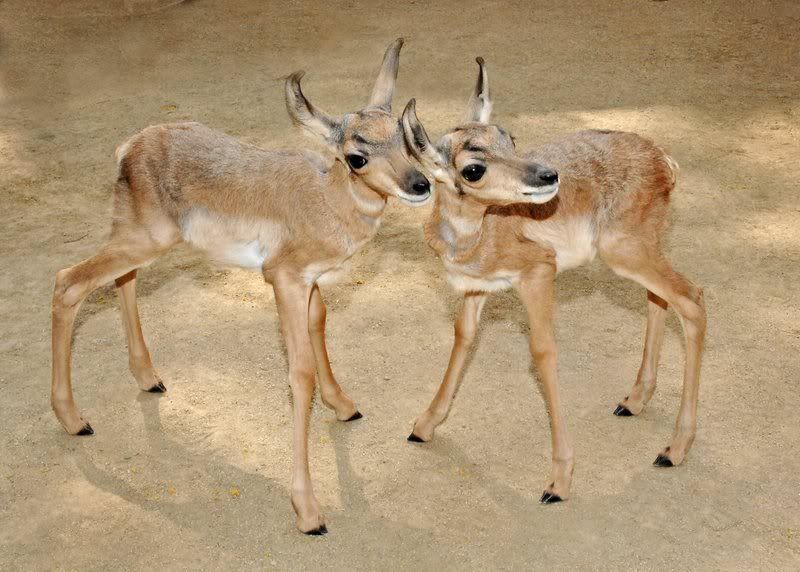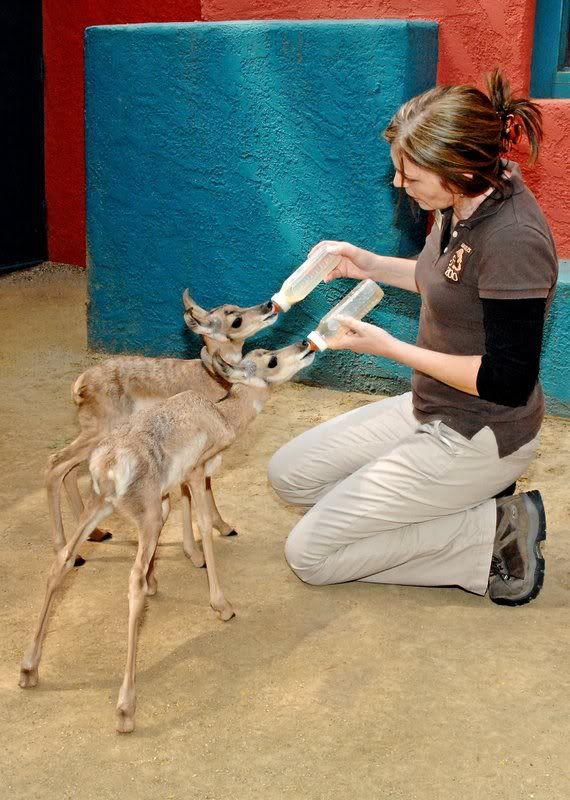
 Two male peninsular pronghorns were born at the L.A. Zoo on March 25, 2008. These fawns are the first of their kind ever born at a Zoo. According to Senior Animal Keeper Kelley Greene, “the brothers have been pulled for hand rearing to ensure that they are given every opportunity to thrive.” When the pair is old enough, they will be sent to the Living Desert in Coachella Valley, Calif.
Two male peninsular pronghorns were born at the L.A. Zoo on March 25, 2008. These fawns are the first of their kind ever born at a Zoo. According to Senior Animal Keeper Kelley Greene, “the brothers have been pulled for hand rearing to ensure that they are given every opportunity to thrive.” When the pair is old enough, they will be sent to the Living Desert in Coachella Valley, Calif.The parents of these two healthy boys were just fawns themselves when they arrived at the L.A. Zoo in July of 2006. These pronghorns originally came here from a breeding center in Mexico and are the first of their species to be on exhibit outside of their home country. The older pronghorns are located in the North American section of the Zoo.
Typically, a pronghorn mother will have one or two fawns weighing in at around seven or eight pounds. When they reach adulthood, pronghorns weigh up to 125 pounds and reach a height of 35 inches. The females are usually 10 to 25 percent smaller then males.
Newborns take their first steps within 30 minutes of birth. By the time they are four days old, they can outrun humans. After just a week, fawns can run faster than dogs and horseback riders over short distances. They are the second fastest land mammal and the fastest ungulate (hoofed mammal), clocking in at anywhere from 40 to 60 miles per hour. They can maintain this speed, without showing any sign of distress, for an hour or longer.
In the wild the fawns will hide for the first three or four weeks of their lives. During these weeks, they come out only to nurse. The fawns will continue to conceal themselves until they are able to move with the rest of the heard.
These graceful animals are mostly active at dawn and dusk, which is when they graze on various plants including, shrubs, weeds, cacti, sagebrush and grasses. Although they will drink when water is available, they can go for weeks without water since they obtain moisture from their food.
The birth of these two pronghorns is a great leap for the conservation efforts of this critically endangered species. Native to Baja California Sur, Mexico, only about 200 of these species survive in the wild. Hunting, cattle ranching and agriculture have resulted in the significant decrease of this species.
In late 2005, seven years after a captive breeding facility was established in Mexico, the first 25 peninsular pronghorns were reintroduced to life in the wild.
The Los Angeles Zoo is partnered with the Vizcaino Desert Biosphere Reserve and the Mexican Government in the Peninsular Pronghorn Recovery Project (PPRP). Since 2000, the Zoo has provided both financial assistance as well as personnel support to the PPRP. The Zoo’s breeding herd is a part of nationwide Species Survival Plan for peninsular pronghorns.



No comments:
Post a Comment